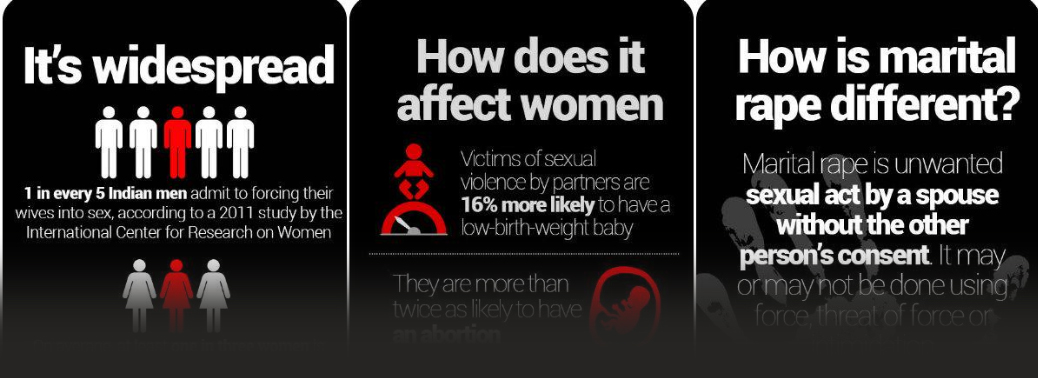MARITAL RAPE
10, Jul 2019

Prelims level : Polity & Governance- Parliament
Mains level : - Role of women and women's organization, population and associated issues, Poverty and developmental issues, urbanization, their problems and their remedies. GS-2: Government policies and interventions for development in various sectors and issues arising out of their design and implementation.
Context:
- Delhi High Court said that court cannot direct the government to frame laws as it is the domain of the legislature and not the judiciary.
- It said the issue of marital rape has to be dealt by the legislature and not the judiciary.
What is Marital Rape?
- Marital rape is any unwanted Sexual Acts by a Spouse or Ex-Spouse, committed without consent and/or against a person’s will, obtained by force, or threat of force, intimidation, or when a person is unable to consent
Sociology of Not Criminalising Marital Rape:
- Mainstream perception that marriage gives the husband constant consent for sexual intercourse.
- Women, therefore, end up being perceived as baby-making machines where their right to bodily autonomy and reproductive rights are inconceivable and preposterous.
- According to Morton Hunt, an American psychologist “the typical marital rapist is a man who still believes that husbands are supposed to “rule” their wives.
- The inability of law and legal institutions to deal with marital rape exposes the limits of the law. It shows that the law predominantly serves the aspirations of the dominant class, at the expense of the marginalised and weak.
Other Related Laws:
- Section 376-A was added in the Indian Penal Code, 1860, which criminalized the rape of a judicially separated wife.
Law Commission:
- Law Commission in its 42nd Report advocated the inclusion of sexual intercourse by a man with his minor wife as an offence it was seen as a ray of hope.
- The Joint Committee that reviewed the proposal dismissed the recommendation.
Arguments against Criminalization of Marital Rape:
- Due to the near impossibility of proving marital rape, its criminalization would only serve as an increased burden to the already overburdened legal system.
Dissatisfied, angry, vengeful wives might charge their innocent husbands with the offence of marital rape. - There is an implied consent to have sexual intercourse when a woman marries a man.
- Marital rape laws would destroy many marriages by preventing any possible reconciliation.
Marital Rape and Constitution:
Article 21 Right to life:
- The judicial interpretation has expanded the scope of Article 21 of the Constitution of India by leaps and bounds and right to live with human dignity 21 is within the ambit of this article.
- Marital rape clearly violates the right to live with dignity of a woman and to that effect, it is submitted, that the exception provided under Section 375 of the Indian Penal Code, 1860 is violation of Article 21 of the Constitution.
Right to Equality:
- Exception under Section 375 of the Indian Penal Code, 1860 discriminates with a wife when it comes to protection from rape.
Conclusion:
- It is conceded that changing the law on sexual offences is a formidable and sensitive task, and more so, in a country like India, where there is a contemporaneous presence of a varied and differentiated system of personal and religious laws that might come into conflict with the new amendments in the statutory criminal law.
- The immediate need is criminalization of marital rape under the Indian Penal Code. But, mere declaration of a conduct as an offence is not enough.
Something more is required to be done for sensitizing the judiciary and the police. - There is also a need to educate the masses about this crime, as the real objective of criminalizing marital rape can only be achieved if the society acknowledges and challenges the prevailing myth that rape by one’s spouse is inconsequential.






